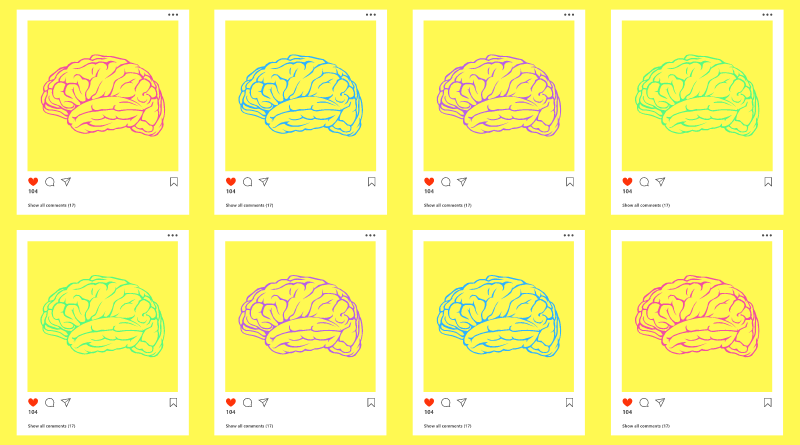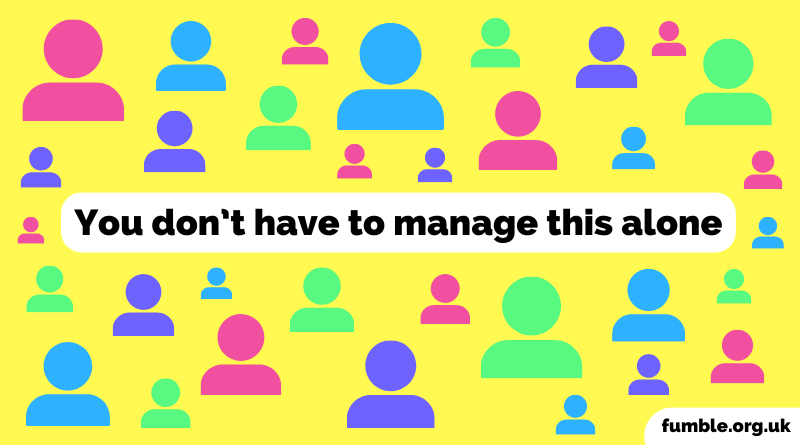Being trans+ & neurodivergent: Our experiences
Our committee of trans+ young people share their experiences and insights on being both trans+ and neurodivergent
As a society, we’re becoming increasingly aware of neurodiversity, what it means to be neurotypical or neurodivergent, and how this can impact our lives.
Of course this also has an impact on all sorts of sex education topics we dive into at Fumble. As part of the “Am I trans?” Translating sex, identity & relationships content series, this piece looks at the intersection of trans+ and neurodivergent identities.
This article is a starting point, where some of our writers share some of their personal experiences. We also include some reliable resources and links for where you can jump to next if you want to learn a bit more.
When we say someone is neurotypical, we mean that societally their brain functions and processes in an expected and typical way. ‘Societally’ is the crucial word here. It’s not that their brain is ‘normal’, but instead that it matches the norms and expectations we have in society.

Because of this, it’s generally easier for neurotypical people to function in the world. Our education, employment, political and social systems are built for neurotypical people. For example, writing an exam for 2 hours straight will likely be much easier for neurotypical students. This means that it can be harder for people who are neurodivergent, when a person’s brain functions and processes information in a different way to what’s considered ‘normal’.
There are lots of different types of neurodivergence. Some well-known examples include: autism (ASD), attention deficit hyperactivity disorder (ADHD), dyslexia, dyspraxia, obsessive compulsive disorder (OCD), and post-traumatic stress disorder (PTSD). But there are many more than these!
We asked a few different trans+ young people about their experiences and insights of being both trans+ and neurodivergent.
Ajax (they/them)
My experience is possibly reversed to how many people experience their life as trans+ and neurodivergent.
I figured out I was non-binary a couple of years before I found out I was neurodivergent (ND). So, rather than knowing my brain worked differently and realising I was different from my peers possibly because of that, I knew I was different but couldn’t understand why.
Alongside this, I thought that the people around me thought of gender as weird and wobbly, too. I thought a lot of things were typical when they weren’t. That made figuring myself out challenging, to say the least.
I will say that after figuring out I’m AuDHD (autistic and have ADHD), a lot of things have clicked into place, even with my transness. And understanding that my brain won’t remain stagnant helped me to accept that my perception of my own gender won’t, either.
Morgan (they/them)
Being neurodivergent has always been a large part of my life.
But coming to terms with my gender was a confusing time for me because, perhaps in addition to my neurodivergences, I regularly didn’t feel comfortable in my body. At first, I believed that it was just caused by neurodiversity and not gender identity.
But, through making friends with more and more genderqueer people and being involved with queer music scenes in my city, I became a lot more open to the fact that I wasn’t cisgender.
I then came to discover that my feelings as a neurodiverse person may be helped by living as how I felt (non-binary). This lifted a massive weight off my chest. It allowed me to focus on and improve my mental health, without issues surrounding gender getting in the way quite as much.
Now with the freedom to present how I want and use the correct pronouns (they/them), I have learnt to understand how my brain works. I am no longer self-conscious about my queer identities and can focus on myself.
Anonymous
One of the shared experiences across being neurodivergent and being trans+ is that you’re never fully sure when you can present as your fully authentic self.
For both of these identities, we have to hide aspects of who we are and, quite notably I think, often hide the things that bring us joy, comfort and ease within the world. There’s anxiety around what might happen if our transness or our neurodivergence is revealed, if the ‘mask’ is let down.
What this does is make inclusive communities all the more important for the intersections of these identities.
My partner and I went to Pride this year, a community event. Even though many of the people I know who are LGBTQ+ are also neurodivergent, Pride itself was not ‘neurodivergence-friendly’ with its large crowds and loud noises (especially with bass and sirens).
It’s not dissimilar from how many LGBTQ+ spaces are clubs and bars, with similar issues. Or how many events and venues don’t share their accessibility information online.
While it may feel safe to be ‘out’ as trans+ in one space, it may not be welcoming to one’s neurodivergence. Just as some spaces inclusive of neurodivergent people may not be accepting of trans+ identities.
Trans+ and neurodivergent people can thrive, if given the spaces to freely be themselves.
Taking your time
Every trans+ and neurodivergent person will have their own unique experience. There’s a lot of variation within the neurodivergence label, let alone with a range of trans+ experiences on top!
Remember to take your time if you’re figuring this out for yourself. There are always people and organisations you can turn to if you need more support. You don’t have to deal with any of it on your own.

Resources to learn more about neurodiversity and neurodivergence:
- Unmasking Autism by Devon Price (book)
- Unmasked by Ellie Middleton (book)
- ADHD & You – What is ADHD? | I am a young person with ADHD
- National Autistic Society – Autism and gender identity
This article is part of our “Am I Trans?” Translating Sex, Identity & Relationships content series: supporting trans+ young people to access sex and relationships education that is relevant to their experiences and needs. Discover the full series here.
We use the term trans+ in our articles as an umbrella term intended to incorporate all transgender, non-binary, agender and genderfluid identities.
Some of the content addresses potentially triggering topics, such as transphobia and gender dysphoria. We’ve added specific content warnings to these pieces, but please take a moment to check in with yourself and how you’re feeling before diving into the series.
Other support
- Discover the full series
- Support & resources for trans+ young people
- Switchboard helpline – for anyone, anywhere in the country, at any point in their journey to discuss anything related to sexuality and gender identity
- Gendered Intelligence – Knowledge is Power resource for young trans+ people
Read more
Last Reviewed 22 April 2024
Image Credit: Katrin Bolovtsova via Unsplash





